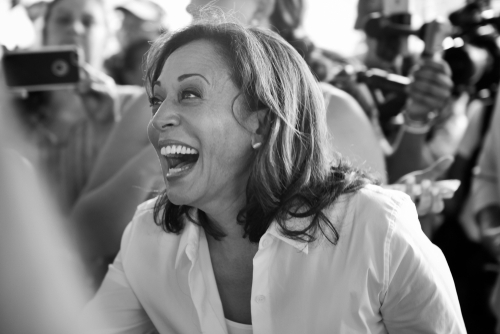
In a striking display of political discord, Vice President Kamala Harris was confronted by a Muslim Democrat state representative during a holiday party at the vice president’s official residence in Washington, D.C. The incident, which took place on December 12th, 2023, saw State Rep. Madinah Wilson-Anton (D-DE) interrupting Harris with a bold message demanding a ceasefire, reflecting deep divisions within the Democratic Party over the issue of Israel and its defense policies.
The confrontation began when Wilson-Anton stood up as Harris was addressing the attendees. She held up a black banner emblazoned with the word “Ceasefire” in large white letters. Despite attempts by the crowd to silence her, Wilson-Anton persisted, questioning the vice president about the lack of Christmas celebrations in Bethlehem and making a provocative statement that “baby Jesus is under rubble.” Her actions underscored the tension between the pro-Hamas faction of the party and traditional Democrats who have historically supported Israel.
Watch: State Representative and other demonstrators disrupted the holiday party of US Vice President Kamala Harris and called for a ceasefire in Gaza. pic.twitter.com/fBdoD66z3u
— MonitorX (@MonitorX99800) December 12, 2023
Harris responded to the interruption by acknowledging the right of individuals to make their voices heard in a democracy but emphasized that it was her turn to speak. The exchange escalated as Wilson-Anton continued to press for a ceasefire, leading to her removal from the event amidst cheers for the vice president.
Outside the residence, the sentiment echoed by Wilson-Anton was shared by a group of pro-Hamas protesters. They gathered to demand immediate action and highlighted the plight of Palestinian Christians, suggesting an inability to celebrate due to ongoing conflict. This demonstration, along with Wilson-Anton’s protest, pointed to a growing faction within the party that is vocally critical of U.S. support for Israel.
KAMALA HECKLED! “Lock her up!” pic.twitter.com/5T7Vi0p1Uf
— Vikki Siddall (@Siddall1Vikki) March 19, 2023
This is not the first time Harris has faced such opposition. Three weeks prior to the holiday party incident, a pro-Hamas protester heckled her at a fundraiser in Los Angeles. These repeated confrontations indicate a persistent and passionate opposition to the administration’s foreign policy stance within certain segments of the Democratic base.
The division within the Democratic Party on this issue is stark. On one side are radical Muslims and progressives who express solidarity with Hamas, while on the other are members who continue the tradition of backing Israel, a policy dating back to President Harry Truman’s recognition of the Jewish state in 1948.
The vice president’s encounter with Wilson-Anton at the holiday party is emblematic of the broader ideological rifts that are surfacing within American politics. As the nation grapples with complex international issues, such as the Israeli-Palestinian conflict, these internal disagreements are likely to surface more frequently and with greater intensity.
The incident has sparked conversations about the role of elected officials in representing diverse viewpoints and the challenges they face in balancing domestic pressures with international diplomacy. It also raises questions about the future direction of U.S. foreign policy as it pertains to the Middle East and the potential implications for party unity.
As the country moves forward, it will be essential to monitor how these internal debates shape the policies and positions of both the Democratic Party and the wider political landscape. The vice president’s experience at the holiday party serves as a reminder that even celebratory events can become arenas for political expression and contention.











